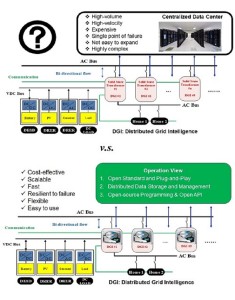In the next-generation power systems (Smart Grid), a large number of distributed energy devices (e.g., distributed generators, distributed energy storage, loads, smart meters) are connected to each other in an internet-like structure. Incorporating millions of new energy devices will require wide-ranging transformation of the nation’s aging electrical grid infrastructure. The key challenge is to efficiently manage a great amount of devices through distributed intelligence. The distributed grid intelligence (DGI) agent is the brain of distributed energy devices. DGI enables every single energy device to not only have a certain intelligence to achieve optimal management locally, but also coordinate with others to achieve a common goal. The massive volume of real-time data collected by DGI will help the grid operators gain a better understanding of a large-scale and highly dynamic power systems. In conventional power systems, the system operation is performed using purely centralized data storage and processing approaches. However, as the number of DGIs increases to more than hundreds of thousands, it is rather intuitive that the state-of-the-art centralized information processing architecture will no longer be sustainable under such big data explosion. The ongoing research work illustrates how advanced ideas from IT industry and power industry can be combined in a unique way. The proposed high-availability distributed file system and data processing framework can be easily tailored to support other data-intensive applications in a large-scale and complex power grids. For example, the proposed DGI nodes can be embedded into any distributed generators (e.g., roof-top PV panel), distributed energy storage devices (e.g., electric vehicle), and loads (e.g., smart home) in a future residential distribution system. If implemented successfully, we can translate Smart Grid with high-volume, high-velocity, and high-variety data to a completely distributed cyber-physical system architecture. In addition, the proposed work can be easily extended to support other cyber-physical system applications (e.g., intelligent transportation system).

